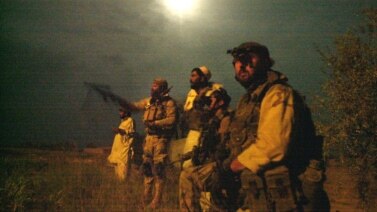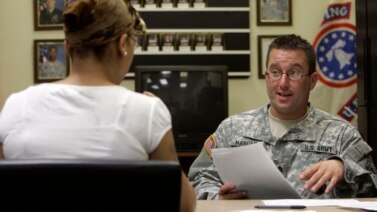Many countries require young men to serve in the armed forces. But in the United States, military service is voluntary. And joining the U.S. military is not an easy process.
Staff Sergeant Terrelle Thomas joined the Air Force nine years ago. He now works as a military recruiter in Woodbridge, Virginia.
His job is to get volunteers to join the U.S. armed forces.
“At the time I was going to school, I was paying for, for school out of my pocket. And I was like 'Man, this is tough,' and I was staying home with my parents. I was like, 'I don't know if I like this as much anymore.' So I went in, talked to a recruiter. He was cool. He broke it down for me, and next thing you know, I'm in...”
Benjamin Spahr volunteered for the military. He says other members of his family have served in the armed forces.
“My mother was enlisted in the Air National Guard and my father was an officer in the Air Force. So I was accustomed to that lifestyle from a young age moving around...”
The armed forces pays its members to attend school, both while they are on active duty and after they leave the military. But not everyone can join the armed forces. There are age limits and volunteers must be successful at mental and physical tests. They must also not be abusing alcohol or taking other drugs.
Training for new recruits is difficult and intense. The recruits must be strong and in good health.
An increasing number of women are joining the military. Madison Foote is one of them.
“Its just the pushups I'm worried about. I'm not very good at pushups. But I think I can do everything else...”
Some Americans volunteer for the armed forces, even when their parents object. The parents are worried about their children because the military deploys troops to many dangerous areas throughout the world.
Oludare Ogunmadewa is a new recruit. He says not everyone in his family supports his decision to enlist in the military.
“My parents are worried, my whole family is worried as well, but it's a risk I feel is necessary for myself -- more for my children, to secure their future.”
The United States ended forced enlistment in 1973, during the Vietnam War. Now, recruits voluntarily sign an agreement to stay in the military for three to six years, depending on their chosen job.
Some volunteers choose to stay longer. Staff Sergeant Thomas says that is because they discover that serving in the military is unlike any other job they could have.
“A lot of veterans that serve their 20, 30 years, the main thing that they talk to me about -- especially when they bring their, their children to the office -- is the camaraderie they establish with the people they met.”
I'm Christopher Jones-Cruise.
Odil Ruzaliyev reported this story for VOANews.com. Christopher Jones-Cruise adapted the report for Learning English. George Grow was the editor.
We want to hear from you. Write to us in the Comments Section, or visit our Facebook page.
Words in This Story
recruiter - n. a person who finds suitable people and convinces them to join a company, an organization, the armed forces, etc.
pocket - n. a usually small cloth bag that is sewn into a piece of clothing, a larger bag, etc., and that is open at the top or side so that you can put things into it
break it down - informal expression : explain
accustomed - adj. familiar with something so that it seems normal or usual (+ to)
lifestyle - n. a particular way of living; the way a person lives or a group of people live
pushup - n. an exercise in which you lie on your stomach and raise and lower your body by straightening and bending your arms
camaraderie - n. a feeling of good friendship among the people in a group


